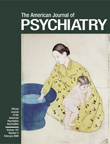Further Evidence of Relation Between Prenatal Famine and Major Affective Disorder
Abstract
OBJECTIVE: In a previous study, the authors demonstrated an association between prenatal famine in middle to late gestation and major affective disorders requiring hospitalization. In this study, they sought to examine the association by using newly identified cases from the Dutch birth cohort used previously to examine the gender specificity of the association and to assess whether this relation is present for both unipolar and bipolar affective disorders. METHOD: The authors compared the risk of major affective disorder requiring hospitalization in birth cohorts who were and were not exposed, in each trimester of gestation, to famine during the Dutch Hunger Winter of 1944–1945. These cases of major affective disorder requiring hospitalization were newly ascertained from a national psychiatric registry. A larger data set from this registry was used for analysis by gender and diagnostic subtype. RESULTS: For the newly ascertained cases, the risk of developing major affective disorder requiring hospitalization was increased for subjects with exposure to famine in the second trimester and was increased significantly for subjects with exposure in the third trimester, relative to unexposed subjects. For the cases from the entire period of ascertainment, the risk of developing affective disorder was significantly increased for those exposed to famine during the second and the third trimesters of gestation. The effects were demonstrated for men and women and for unipolar and bipolar affective disorders. CONCLUSIONS: These results provide support for the authors’ previous findings on the association between middle to late gestational famine and affective disorder.



